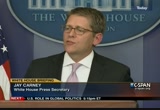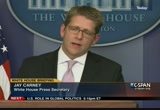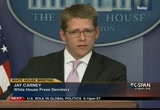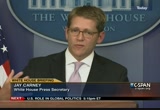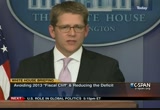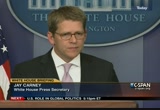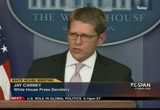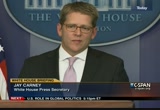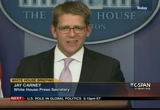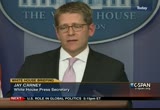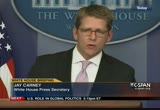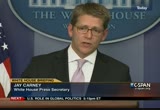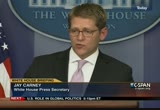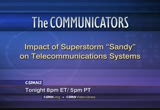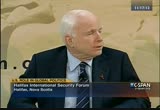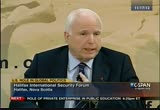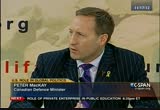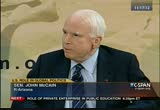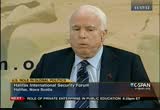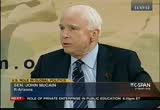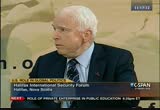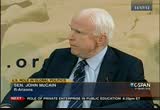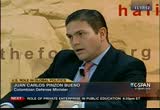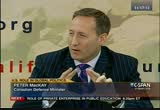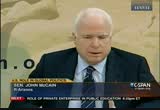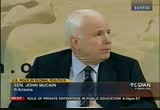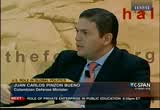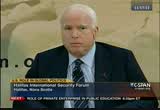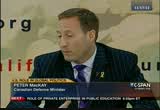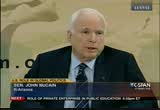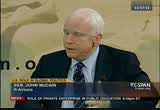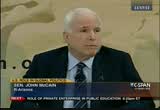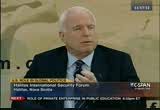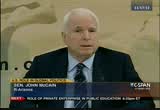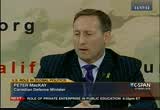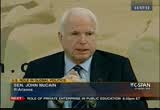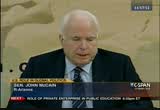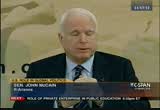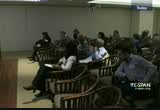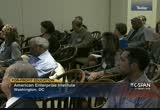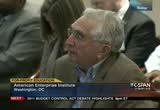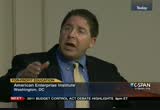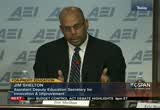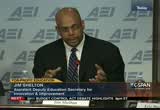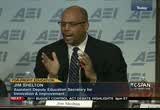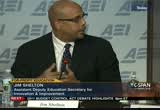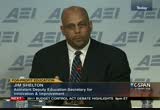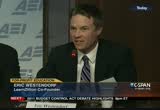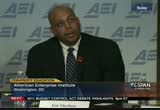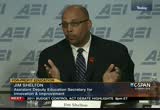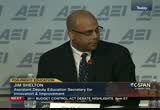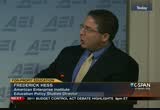tv Public Affairs CSPAN November 26, 2012 5:00pm-8:00pm EST
5:00 pm
and others on these important issues. engaging not just with the denizens of washington, but with the broader american public. it is a very -- it is very important to him. >> asking about afghanistan, there are reports that the president has made decisions on the troop levels that he wants. is that the case? >> that is another case. he will review options. there are two things to look out here. it is not the logo -- it is not the hope that is the case.
5:01 pm
we will continue beyond 2014 we will wind down. he has not reviewed options or made any decisions on it. the fulfillment of his commitment he made very clearly is to continue to draw down forces in afghanistan from the levels now that we have drawn down the surgeon forces over the course of the next two years. the pace of that drawdown is a decision and that he will be making in coming weeks and months. >> so general allan had recommended leaving between 6000-15,000 american troops there. is that not true? >> that's different than what you said. you said the president had decided. he has not decided on anything. he will evaluate proposals from the pentagon and elsewhere on
5:02 pm
what we might negotiate with the afghan government on a future presence in afghanistan procter we fulfill our commitments to end the war in afghanistan in 2014. that commitment and that presents would be very in scope as we talk about counterterrorism operations and the training of afghan forces. >> last one hour. the meeting with business leaders today, they're making progress on that front? >> the president did not have a meeting with business leaders today. tom donahue and others had a separate meeting with some senior people over here. jack lew and others. that's far the process we are engaged in that i described earlier, an ongoing conversation
5:03 pm
with leaders on capitol hill, rank-and-file, staff, others, business leaders large and small as well as civic, labor, other leaders will have a stake in this very important debate. >> is expected to meet with other stakeholders to date? >> not unaware of. >> you said you came out here to say that the president had spoken to the speaker and senate to read over the weekend. did you say all you needed to say about that? >> i did. i do not have any more details for you. he had these conversations, so i was prepared to confront those reports. >> those the white house in the schedule open today in the hopes that a meeting with develop?
5:04 pm
>> the president will continue to engage with leaders and congress, as appropriate. that is a process we are engaging in with congress that the staff and member level in this important discussion and we will continue to do that. we will continue to meet with business leaders and others this week. he will continue to engage in other ways on this issue in the hopes of achieving a goal here, a balanced solution to our longer-term debt challenges. protect a little class, protecting seniors, -- protecting the lower class. "we need to make the investments that will help the economy grow for years into the future. although that is achievable.
5:05 pm
with a little give, we can get it done. >> with new say a deal is best achieved by the end of the year, does that rule out the president agreeing to kicking it over into next year? i was asked if he supports the it -- what did you call them? the fiscal cliff divers? it is our belief in president's belief as being spelled out in the plant today, it would rain damage being done to the economy if we do not extend tax cuts for the middle-class and address the other elements of the fiscal cliff and, more broadly speaking, address our long term fiscal challenges and how the economy creates jobs.
5:06 pm
we need to get this done and that is what we're working on. >> one more? >> olivier, alexis, april. >> you have said repeatedly "we" have expressed concerns? >> i would refer to the state department. >> were you for warrant that mr. mursi was going to do this? -- were you forewarned mr. morsi was going to do this? >> these are separate issues. we have raised our concerns and that, i think in party answers your question. secretary clinton is focused on working with the president down others, prime minister netanyahu, to help bring about a ceasefire and other allies can be saved and the possibility of
5:07 pm
moving forward on negotiations for more enduring peace could be realized. that was very important. the president played a very important role in that. separately, we have raised concerns about some of the decisions and declarations made on november 22nd and we continue to engage on this with the egyptians. the important thing is that the egyptian people want a government that reflects their will and we accept that. >> it was murky before thanksgiving. can you clarify the $4 trillion in debt as a reduction of over 10 years? >> it is reflected in his budget proposals that i know you all have read covered cover and is still the most substantive
5:08 pm
proposal by an elected official that actually achieves the target of $4 trillion in deficit reductions in a balanced way. >> is there a consensus around that? is there consensus among all parties that $4 trillion is the goal docks "that is the president's goal talking about the longer-term issues -- is that the goal? >> that is the president will talking about the fiscal cliff challenges. he has described that going backed to the spring and summer 2011 as a big deal. it would help put us on a sustainable path that helped create the kind of ratio of deficit to gdp that alan krueger and others have been an discussing. that is his goal. when we talk about the longer-
5:09 pm
term deficit reduction targets, the near term target, one that could be resolved tomorrow if the house so desired, would be to pass the extension of the middle class tax cuts which would remove a substantial portion of the fiscal cliff right away and would give certainty to consumers and retailers right away. the president, as he has repeatedly, urges the house to do that. we should not hold the middle class hostage. we should not hold 98% of the american people hostage to an insistence that millionaires and billionaires, those making up words of $250,000 get tax cuts forward. it is not good politics. >> last person. >> could we see the president announced concerns about egypt? could we see this president
5:10 pm
reached out to the president and talk about what is going on? >> the president, as you know, has broken no on numerous occasions with president -- has occasions mn numerous with numerousoris. -- with president morsi going forward. i do not have an agenda on what those conversations with look- alike. we have raised concerns. the state department put out a statement on this about the briefing. the state department have more information of this of a client how he has communicated those concerns. our interest is in the process, the transition to a democracy continuing in the development of a government that reflects the will of the egyptian people.
5:11 pm
we are working towards that. we believe it is in the interest of the american people and of the united states but also because it reflects the will and the interest of the egyptian people. >> democracy is in the process, but doesn't look like there is a transitioning to a dictatorship? >> important to take a step back. in november 2012, lookout -- look at how much has changed in that region of since late 2010. look at how much egypt has changed since early 2011. the transition, if anyone ever promised that it would be some move, they were foolhardy. that was never going to be the case. the president focuses on the basic principles that guide his policy toward egypt and toward the overall region when it comes
5:12 pm
to countries attempting to transition to democracy. again, we have raised concerns. >> the state department press release -- have been very careful in what you have said. you have not been critical. you have been very careful in the wording. >> what is important here is the tradition to democracy will be achieved by the egyptian people, not by the manner in which we raised concerns. we have done that and will continue to do that where appropriate. we are constantly monitoring developments in egypt and working with the egyptians. we have a very important relationships. again, it's important to take a longer view here. that is not to say that concerns
5:13 pm
that have been raised are not significant and serious, because they are. we raised those concerns where appropriate, but it is a corporate to look at what the goals are, on behalf whose those goals are being achieved, and that is the egyptian people. i do not have a new language to give you today on what our view on this is. >> in singapore criticizing it, would you say that is incorrect? >> i would say we have concerns and we have raised them in. >> how was the process coming with his administration? >> who is it going to be? >> i have no personnel news
5:14 pm
jamaica veneti and -- no time lines. i do not have anything for you. it is the important piece but not the only piece. thanks, guys. [captioning performed by national captioning institute] [captions copyright national cable satellite corp. 2012] >> as negotiations continue between president obama and congressional leaders, the focus on the fiscal cliff, going back to august 2011 to look at how we got here. some of the debate and is conferences relating to the passage of the budget control act treating the spending cuts beginning tonight at 8:00 p.m. eastern here on c-span. also tonight at 8:00 on c-span2, "the communicators." the effect federal emergencies have on communications. among our guests for the president of regulatory affairs of the wireless association and
5:15 pm
and the congressman from the commerce committee. >> are 16 or 17 basis, we have military-run in schools. the average cost to run them per year is $50,000 per student. almost four times what the rest of public education costs. the vast majority of our bases, we use public schools. we could take the money we're spending today, pay every school system $14,000 per child and save billions of dollars per year. with the same or better outcomes. >> this weekend, talking with oklahoma senator tom coburn about the fiscal cliff, affordable care act, and defense -- the future of the republican party. the senator has written about several books and reports including his latest, "the debt
5:16 pm
bomb." medical doctor, senator, and author, tom coburn on c-span and2. >> arizona senator john mccain called the zero obama's policy towards syria -- called the obama's policy toward syria shameful. this is just about one hour. >> good afternoon. the last session before lunch, the good guys, the special burden on democratic nations. we have a star-studded cast and i will hand it over to our moderator, kathleen koch. >> . ruhle for joining us today. the title of our panel in and of
5:17 pm
itself, "the good guys?" it reflects the self doubt that many of us have had today house we'll lot at a recent intervention in countries like iraq, afghanistan. we asked ourselves, were we the good guys? did we get it right? did we do the right thing? did we do more harm than good? in our panel today, i would like us not to look back, not to rehash the past, but let's look forward and really reflect on the lessons learned in these interventions and see how they can inform the actions of our communities of democracies as we move forward into the future. first, we have a panel that virtually needs no introduction but i will briefly introduce them.
5:18 pm
juan carlos pinzo. senator john mccain. someone who i have personally had the honor to interviews and he was a congressman back in the early a.d.'s. welcome of, senator. our waterfront minister of national defence in canada, peter mackay. and finally josef joffe, the editor of the weekly german newspaper "die zeit." senator, i would like to start with you. the first panel will looking at the question of the new normal and the united states current strategy. i could literally feel you chomp. the bid as they discussed what they called u.s.'s role in the world be in flux that we are less willing than ever before to try to step up especially when there's no pressing national interest. >> first of all, as politicians,
5:19 pm
we have to understand what our constituencies, what our citizens, what our priorities are and their concerns. the former chairman of the joint chiefs of staff said our greatest national security threat is our economy. i think that is absolutely true. when we have half of the homes in my home state of arizona that are still under water and worth less than the mortgages they are paying, there's obviously attention on that aspect of their lives. there is reluctance. this calls for leadership and why this is happening in the arab world-wide there is a rise of radical extreme is over time,
5:20 pm
why china in there sometimes immature behavior can pose a threat over time to the stability in the asia-pacific regions. it is up to was to try and explain to our citizens and our constituents why it is that we have to do a lot of things. that is the favorite target. i just want to mention one thing. there has always been an element from reticular early in the american party, between the isolationists and those who believe that we have a role to play in the world. you can trace it back to after world war i after we rejected membership in the league of nations. lindbergh, ford, the post-world war ii, the eisenhower winning. we're seeing about coming back
5:21 pm
strongly in my party today. >> how much does that concern you, sir? >> a great deal. the senator from kentucky just before we went out, he voted to cut off aid to pakistan, libya, and egypt. it only got 10 votes, but now that is spreading dollar round the far right. they should vote to cut that aided. we're seeing that a merger in our party and, in our nation now, and a lot of people are saying, why should we be spending money on these foreign adventures and foreign assistance when we have so much trouble at home? that debate will rage between now and the next election, particularly the next presidential elections. >> minister mackay, your administration has been a loyal ally to the united states,
5:22 pm
falling into afghanistan. considering the outcome in these two places, how would you say you're nations point of view has changed, if it has come on the responsibilities on democracy to take action to? >> i want to play on something senator mccain just said. in considering interventions from military contributions, foreign aid, there is no question that the very stormy economic situation that we are all in, the fragility of the economy still directly influences a government's thought process. it certainly is a determining factor as to what, and if, a country will contribute to an intervention. >> the cut backs of the british. >> they are cutting off ships. they're getting notices there
5:23 pm
will not be a job out for them when they return for service overseas. "my father had an expression that i thought was very act. when the drinking hole starts to go downtown monday and will start to look at each other differently. >> what does that mean as we go forward? >> the water table is low. canada during the united states and others that our allies to go to our afghanistan. we have a security council resolution. there was a clear indication that, had we not, afghanistan would remain an incubator and an exporter of terrorism. to answer, was the right decision to go? yes. afghanistan certainly no longer poses that threat to the world. i know there will be some very insightful comments about that. but the reality, to bring this into the topic of this panel,
5:24 pm
there is a higher calling, in my view, an obligation on democracies, on countries that see themselves as, yes, accountable to their people, but accountable to the broader world. we cannot sit in splendid isolation in north america and think the world will not come to our door. . 9/11. not without cost, not without very informed decision making. off and instructed by the security council and other bodies, other consultations, nato be in very high on that list. what i suspect we will get to warn this panel is syria. but what is happening in israel as we gather here this week? these are the questions of our time.
5:25 pm
these are the challenges of our generation and. that, i think, is one of the great benefits of opportunities like halifax, to have a very in- depth discussion on how we got as a community -- a community of democracies, a community of countries that care, are compassionate, and are able to do something to stop the slaughter of innocent civilians. >> there were many who say we need to have more young emerging democracies that need to be stepping up to the plate and taking on more of your responsibilities. indonesia, india, brazil, turkey, south africa, but at the same time, we also hear the statements made that as they get involved and should step up to the plate in helping to nurture democracy come to protest human rights, but that they also have to make sure there roadhouses in order.
5:26 pm
what are your thoughts on that? >> certainly, more nations now have their role to play. definitely, in our case, we're trying to play a role based on our experience. as you might know, our country just 10, 20 years ago was always mentioned with drug trafficking and corruption and. that was the case. a more important message to leave before this panel is democracy is very important. it is important when the people really want to see their relations. with what happened in colombia,
5:27 pm
in our case, very strong, important leadership for municipal leaders and, at the same time, and national will to find a role has been critical. after that, then you find international support and cooperation. in the case of colombia, it is an interesting case of how to get international support but falling behind the national leadership can become a process that can provide important results. in the end, what we are getting right now is stronger institutions. those institutions are the ones that are allowing us to think about a better future and a better democracy. currently, what is going on in our case is that we have very big challenges, and we know
5:28 pm
that. but we need to keep doing what we're doing now, keep moving forward. more importantly, we have learned that with a very humble attitude, we can offer other nations what we have learned, our experience. that is what we're trying to do now, to be very helpful, but at the same time say, this is what we did, this is what we learned. come with us. we can give you these ideas. >> mr. joffe, as we look at the current economic situation globally, in the united states, in europe, around the world, as we talk about trying to nurture and support democracy to protect human rights, as both the senator and the minister mentioned earlier, the? cynne thune not so much what we want to do and what their responsibilities are, but what
5:29 pm
we can do, afford to do in these times. >> you're right that we should not dwell too much in the past. intervention or not intervening teaches us something about the future. darfur, libya, and then and now syria. if you look at that lineup some very nasty questions arise. first, what moral duty demands how much sacrifice? second, do i have to commit more bloodshed than the blood shed 1/2 to prevent? 3, do i have the capabilities?
5:30 pm
and that's what we're talking about here. what are mischances of success? 5, how sustainable was my mission in? how much damage to our have? look at iraq and afghanistan. 6, is there an end to this intervention? do we have an exit strategy? finally, will the killing resume when i leave? most i come back? when to look at it this way and you apply that to these cases, you understand why we intervened anin only one case. it did not take any sacrifice on our part because it was just in the year. we got the ammunition from the united states. there was an interest on behalf of the united -- the european union because it was too close to home. we did not go on the ground and we did not stay.
5:31 pm
there are some very harsh living conditions. the moral obligation is only one part of the compass. >> that's an interesting point about the obligation, the bird and that we're talking about. not all the democracies are treated equally. not all democracies came about in the same way, for one, or fashion. one of the subject around the tables at the nato is burden sharing. this leads into a question of what can you contribute? you can contribute something. when the decision is made to make an intervention, which is a difficult one, and you're absolutely right to suggest that there are long-term implications, you certainly do not want to leave things worse than you found them. this is, of course, much of the consternation and distress, i
5:32 pm
suspect, of the people in afghanistan that are going to be feeling post 2014. what is going to be left behind? what about the ongoing develop the projects that are in that country? that has been true going back to world war ii . and beyond. to put this in the context of syria, who can make the most meaningful contributions now? the contribution does not have to be militarily? russia, i would suggest, should be called upon to step up and belly up to the u.n. security council. they should exert influence. day, i suggest, are the most influential at this time, and they have the ability, number one, to stop supporting this regime that is slaughtering its citizens, to stop, by its
5:33 pm
acquiescence, standing on the sidelines and letting it happen while the rest of the world realize its hands. >> how do you accomplish that? >> i think they can assert influence in syria. they are one of the few countries that really can at this point. iran, forget it. >> how? what they can support the security camera resolutions, which thus far we have been unable to achieve -- security council resolutions, which we have been unable to achieve. >> what i think we are talking about here is, where do we intervene? where do we not? what is the rationale for doing so or to not do so? i think it's got to be based on one fundamental principle -- our interests, our values, and our values are our interests. i say about because we went to bosnia and not because they were
5:34 pm
a threat to the united states of america but because muslims were being slaughtered. we went in because we could stop it. the same thing with kosovo. we regretted -- president clinton said his deepest regret "that we did not stop the slaughter of 800,000 people in rwanda. also, that did. the question how quickly we could have intervened effectively in rwanda. the strong caveat to that is we cannot right every wrong. we cannot put out every fire. we cannot intervene even though there is a compelling humanitarian interest. where we can, we should. it is in our interest to see countries develop and have a chance for democracy and the things we have all stood for, certainly in our country, for well over 200 years.
5:35 pm
the decision has to be made by policy makers for our interests and our values, where possible, but also you have to have the support of the american people. otherwise, like the war in vietnam, you leave in disarray because the american people lost confidence in their government and the mission. in iran,, as good as relations we have in vietnam now, we still condemned people to reeducation, concentration camps, execution, all of those things. the discussion has to be made between leaders and their constituents is if we see something that we can rectify, we should. but we have to understand the limitations of those interventions because you are far worse off if you fail than if you had never gone there in
5:36 pm
the first place. that resistance syria. i'm ashamed. i'm ashamed. i'm ashamed of america. i have been to refugee camps and met the all women who have been gang raped. i have met people who have had their kids shot before their rise. i have met the defectors who said their instructions were to go around to rape, kill, and torture. while we sit by and watch that happen without giving weapons to defend themselves, this will be a shameful chapter in american history because we could have done something and we can do something today, but we won't. the president has been reelected and he will be re-examining all of this, but only 7000 people have been massacred, in the grand scheme of things, that's not too many, but we could have done something about it and we can still do something about it. we can do it collectively and to
5:37 pm
allow, in all due respect, because russia vetoes irresolution in the security council is not sufficient enough reason to not act. >> our values are our interests and vice versa? i'm not sure that's the case. in the case of iraq, the interest was to maintain the bastion of power against an obstructionist iran. it intervened against the bad guy which was required by values. and then it was liberating the power of iran and making them that much stronger which was given help the airline. let me finish. >> the perception that the time, the greater threat was the weapons of mass destruction. that was a greater threat received, whether it was right or wrong, that we believe the
5:38 pm
threat from iran was. >> maybe we could not have predicted that outcome. our interests and our values were not the same. when we get to syria, the problem with these countries is that there's a civil war. in a civil war, you do not necessarily tell between good guys and bad guys. you give weapons to one party which in subjugates the other and then they slaughter the losers. that is what bothers and so much as the way we have to go there and stay there and then protect our former enemies against our former friends or no slaughtering these guys. that is what the point here is very simple. to go in, you have to be ready to stay to protect those who
5:39 pm
knew how helped when you help the others. it's a long-term obligations. you cannot just go in and leave. >> i come from a place where we have a different outtake. listening to this discussion and it is kind of wonderful to see how large nations can think about this. but i would comment on the following. certainly, when you see human- rights violations and you see the case that senator mccain has described, i understand the moral obligation to find a way to solve things. of i think we're in an era and not intervention but
5:40 pm
cooperation. i believe our case could be one to look out. when you intervene, my impression is that, sooner or later, he will harm the people you're trying to support. someone from the outside is trying to solve the problems or to take over. but when you think you can support a system that is really willing to make things happen, respecting culture, respecting realities, understanding what is behind, i think the potential of that cooperation and support could bring something more lasting and, if i can use that word.
5:41 pm
it is not a matter of defending and protecting human rights protecting people, protecting the right values of democracy and respecting human life, but it is the way. that kind of discussion could be come in the following years. from my perspective, from what we have learned, what you have learned in your presence in the middle east, and in other cases like ours. i tell you very openly, if we can say we have progress, we have not finished, but we do have progress. we are already having a vision of peace because what we have done and what we have gained. that has come out very well connected to with your support. i have to be frank. with that kind of help. the u.k. has supported us very
5:42 pm
much. we have been recently asking canada to support us on some of our structural reforms. in my case, right now, military reforms. it is getting a kind of support that is allowing us to get into these different levels. not all cases are equal, but it depends on what you find. for most, the idea of intervention and, i think it is better thinking about cooperation, even with the difficult partners. >> i really would like to get to the audience now. we have a fabulous panel. >> thank you so much. i'm from the united states. thank you, mr. mackay for your
5:43 pm
hospitality this year. this is a brilliant events. i have to say thank you to senator mccain for your service to our country and your calendar, as usual. -- your candor. the title -- of the really are the good guys -- have the special burden. for the first time have been convened in halifax, canada is in the chair of the arctic council. after canada's chairmanship it will be the united states. there are only eight nations making up the arctic council, but the whole world is interested. china is interested in maritime commerce potential and the resources and the potential for a car rental catastrophes, which is very gigantic there as well. rescue missions, etc. what is the special burdens of canada and the united states with respect to the arctic
5:44 pm
council and should countries like china be allowed observance status? do think the next congress will ratify the treaty? if not, why not? >> the special burden, the role of the arctic council members, all of whom are democracies, one of the -- one of the underpinnings is a rules-based system. a respect for the rule of law. in addition to accountability to the people who elect you. canada has tremendous attachment and affection and over the largest part of the arctic. there are certain special obligations that come with that, stored ship of the environment. we have enormous interest in our own resources and our people.
5:45 pm
40% of canadian land mass is above the 50th parallel, yet we only health -- have 100,000 of our people living there. is an enormous challenge, obligation, even to continue to exert the sovereignty. you mentioned a search and rescue. at this time of year, but there are 24 hours a day and temperatures plummet below 50 degrees celsius. you have open waters and changes that are born to create a lot of challenges because more people are simply going to go there and more countries have exerted or expressed an interest. you mentioned china. there are many others who want to be a part of this arctic council. to your question about the obligation to, i think it comes back to people playing by the rules and respectable of the
5:46 pm
fact that there are places where disputes arise, as is the fact between canada and the united states on the bering sea and some of the border areas of the arctic. i think there is a recognition and that countries who adhere to a rules-based approach, you can resolve these in a court, an international court, or the u. andn. the country's -- or the un. if the country is not a democracy, they do not respect rules. putting a suicide bombs on mentally disabled people and sending them into a crowded marketplace? these are unthinkable atrocities that terrorists commit because there is no ground in, no inhibitions. they do not adhere to any role
5:47 pm
whatsoever. that is why i think some countries, and some jurists, have commented that democracies are sometimes called or handcuffed in their ability to respond in conflict -- sometimes cobbled or handcuffed. those rules for many, certainly non-state actors, do not exist, thus the conundrum. how do you respond? and sometimes respond with restraint when you're motion is to do otherwise? >> senator mccain. >> john kerry has been very active in this issue. i think it will require a presidential push to convince a few. i think it's important that we move forward with that. just one additional thing. as i mentioned, and as we know,
5:48 pm
the world is so rapidly changing. the unpredictability of the world is the one thing but i think we would all agree on. look at the world, as i mentioned last night, the first time we convened here and look at it today. what will it be like four years from now darks we don't know. we have no real idea. anyone who predicted the world four years ago would like -- would be like this today, i would like to meet year. -- i would like to meet yuo. we need common principles of international behavior. we have to stick to those principles. all of us, at least during the cold war, we lived in a very predictable world. we did. we knew the divisions and capabilities. we do not know what's going to happen. i don't know what will happen in china. i tell believe that 1.3 billion people are going to be satisfied
5:49 pm
forever under the present regime in which they live. it seems to me it's even more important that we have certain principles guiding us. i want to emphasize again and that it does not mean we go everywhere, fight every battle, pullout are pestilent every provocation. it has to be tempered by reality and it has to be tempered by the fact that we are democracies and we have to have our people behind us. jolie where my people are going so i can get out in front in them. -- show me where my people are going. [laughter] i think it was voltaire. i'm not sure. maybe both. >> next question. i neglected to call my duties as a moderator. if you would please stand, give us your name and organization and represent and then ask your question. >> cameron from canada.
5:50 pm
i work for research in motion, but that is not relevant. my question is the discussion was about the special board of nato countries and those closely aligned, australia, japan, colombia. there are other great democracy that do not be seen as part of the camps. while i would not expect those countries to necessarily sent troops to libya or something like that, i would expect a greater concern for democracy, human rights, especially in those regions, places like zimbabwe and burma. we have not seen them step up take a huge role diplomatically or anything else. is not as leaders of the democratic world, but more as leaders of the developing or emerging economies.
5:51 pm
that solidarity keeps them from the democratic values that we share. is there a way you can and treat those countries to play a greater role to see themselves more as a democratic power and sharing, and democratic values and making that a higher priority in your own foreign policy? >> the short answer would be yes. all those countries that you have listed, and more, certainly in terms of their economic capacity, compared to some of the smaller democracies, particularly some in the americas that have a long history of embracing democratic values, but they would not have the bankroll, if you will, to participate in international missions. again i, i keep using afghanistan as a touchstone, but there are 40 countries with
5:52 pm
boots on the ground. there are more than 60 that contribute on the development side. japan now, sweden. some of those democracies that are really in making a remarkable difference in the day-to-day lives of afghans. there are many ways where democracy can help spread democracy, which i think is a worthwhile endeavor and we would agree. there are different ways in which can engage non-militarily that are arguably going to have a much needed defect in parts of the world right now. in some of these troubled areas, it is clearly at a to pinpoint where development is not the issue. >> but someone has to protect those nice swedes and others who teach their kids against the bad guys, right? if you look around, why aren't other democracies plan and this same game?
5:53 pm
apparently, it seems to be an anglo-saxon have it. no wonder they are the oldest democracies, u.s. and britain are. the brits were already fighting hard among themselves in the 1820's so should they help greece in the uprising against the turks? [laughter] that, by the way, is a very profound joke. if you are an empire that wants to make sure you play by the rules, it is always good to have a group that is discriminated against and they will go off to build an empire. it is very important. it just came to me with that? . if you look out the rest of the democratic world, the spaniards,
5:54 pm
you name it, they're not exactly gung ho about putting their blood on the line when it comes to pursuing our values. the point, i guess, here is that you always have to have somebody who runs the show. there has to be one of very large power. usually it is anglo-saxon. we are now in a phase of american development with the power that has carried the burden over the last 60 years, as we all know, wants to lead from behind and is retracting from afghanistan, from iraq, and they're now exerting their power from afar and from above. drones above, boots on the ground. i fear if nobody takes on the responsibility of organizing and
5:55 pm
maintaining, it will not be in the of -- will not be india. >> go ahead, minister. >> i was just boring to comments -- i was just going to comment, there are more threats brought in the world that are allowing the market sees -- that are allowed and democracies. think about this in general terms. is is really creating a problem for nation states in the sense that we have borders, we have constraints. we cannot go after all the problems that we find from drug- trafficking to counterfeiting of the mark explosives, weapons,
5:56 pm
movement, etc. i think that allows an opportunity for increasing cooperation. by the way, those nations that get isolated with a lack of international support easily can find their democracies at risk. in our case, what we're trying to do is understand that anything that happens to our neighbors, in the end, it can become a problem for us. use i think we're trying to this approach is not to tell them you should do this or that, but go in there and ask what they need. and then say what you can do for them. this is one way to contribute to these -- >> the form of intervention. >> senator mikulski.
5:57 pm
minister bueno, questions and comments are to you. what can we do to help these democracies? this is centered around the topic for concept of mass of reaction where military is needed and then massive expenditures of foreign aid. it senator mccain and rightly said the people in the united states of america are war weary. this goes to colombia and the countries in latin america. in one sense, where democracy plays a role, educational, the empowerment of women, the bringing in a science and technology. you are a world bank guy.
5:58 pm
you went to harvard and dell was science and technology. here we are was tremendous knowledge in these fields. we talk about helping democracies. how do you see that from not only indicating these villages but scholarships and others, whether it is the french, the canadians, the brits, so that there are always for educational, the empowerment of women come are raising their status, inclusion. the american bar society and all those groups. what do you think about that? is it such that unless you have big muscular defense, big muscular foreign aid? i don't think america will ever be a wimp in anything, but i have an additional school of
5:59 pm
thought. what do you think? what could help that in america? >> thank you. generally, to speak a very frankly and what you have requested, the support of law enforcement in colombia has been helpful. that is a first step. as you said coming in several points to develop. increasing security capabilities and increasing the state's capability to promote human rights. in a case like ours, we have had so many problems for so many years, we will continue to strengthen those capabilities. the more that i am the minister of defense, i can tell you we have been discussing this in our own cabinet meetings.
6:00 pm
the more i go to faraway places, going into the jungle, or going in where we are currently under investigative operations to try to bring back these parts ofcou. into a better future. more and more people in those meetings have 10%, a 15% of the time, security-specific issues. but 80%, 85% of the time, health care solution for an education solution, i think people, certainly, our right. i think what we're trying, and our experience shows that no doubt, you need to bring security in order to start to
6:01 pm
have the opportunity of promoting human rights. to promote the right values of democracy. but behind that, there are many things you have to, in order to bring equality, in order to promote opportunities for the people. i think that is an effort in our case. maybe for the next 20-30 years not just defeating drug traffickers, but what are we going to bring to those places that are not going to allow that to fall into other criminal hands. >> i would just like to say, very quickly, i believe one of the most important aspects of our success in the world is the students who come to the united states and our scholarship programs. i also think our military to military relations.
6:02 pm
our military to military programs were military from countries all over the world come to the united states and our various schools and colleges and it has paid incredible dividends. exchange programs. 25,000 chinese students graduate from american universities last year. i believe they go home and have a tremendous impact. >> i would totally agree. i think senator mccloskey's point is a spot on. in order for the development and the aid to take root, there has to be ground prepared. as security is the essential ingredient -- ingredient. my colleague from columbia would agree. it is like sowing seeds on a paved parking lot. if they're going to blow away. they're not going to take root. education is key to all of that
6:03 pm
and enabling women. we are seeing more women sitting in parliament and afghanistan that we are in many of our democratic countries. we saw firsthand the impact that girls going to school -- that, to me, will be the absolutely critical piece for that country if it is to continue to evolve in a positive direction as women become decision makers. the enthusiasm in which an entire generation of young afghan women have an education is all-inspiring. -- awe-inspiring. but it has to be protected. if people get off the back of the helicopter or plane and be slaughtered unless there are soldiers there to protect them and to the good work. >> the scots and british -- [indiscernible] [laughter] going back to the title, the
6:04 pm
good guys, in the cold war, we did not believe we were different than the soviets. we believe we were better and that what we stood for and our values were better than theirs. are we in danger, now, in slipping into the equivalent and not wanting to talk about our values in case they undermine an operation in particular? i think of the human rights in china and women rights. do we want to still be better, or just different? >> i could attack that first very briefly. i think we made -- history shows us that alliances with people who are on savory who have oppressed their people, who had engaged in bad and corrupt governments usually turns out not to very well, even if it seems to be most convenient at the time.
6:05 pm
there was an editorial in "washington post" this morning that i agreed with. that is, and that is very unusual. [laughter] it shows that even -- but anyway, i am not so sure that the president of the united states should dignify -- in cambodia. he is corrupt. i also do not believe that, perhaps, it may be time for the president to go to burma. burma has a long way to go. she did not think this was the right time to do it. upas stoat a presidential visit on a country, it does a lot for that country. i think that we have to be very careful who we align ourselves with, even if it seems to be most expedient at the moment. >> i think you have to
6:06 pm
absolutely action your values. it's easy to say, of course. what does that really mean? offering encouragement to fledging democracies. and embracing every single step that countries that are trying to embrace the value that we hold dear. that means, you know, when you think about what is happening to israel. 5000 of rockets fired into their country since 9/11. what country on the planet could tolerate that? and going back to the senator's comments about the accountability of the people who elect to -- if the number 1 job of any government elected anywhere in the world is to protect the safety and security of its population. that is why we have militaries. a very capable ones.
6:07 pm
you know, i am sorry, i remember very recently meeting with some of veterans. i remember some who had landed and it did not go well. and some who had landed at normandy and it went better. one of them made a comment about the fact that there seem to be a lot of storm clouds gathering again and were in places seemed imminent. he said, i thought we said, never again. well, that was 70 years ago. it is still never again. there are a lot of places that you need protection in the world today. john, you were one that did. that did protect you by your actions. and scotty, we are very grateful for what you have done. >> i want to make it harder. what we have suddenly become
6:08 pm
aware of is the fundamental transformation of the strategic map of the middle east. all of the bad guys are where our guys are gone, like mubarak. probably assad is also a goner. a night -- a nice place like tunisia. -- turning toward the extremists. hamas attack on israel is not new. here we are, being reminded once more, be careful what you wish for. we want a democracy. we seem to be getting is long -- islamization. a movement that is not friendly towards the west, let alone to israel.
6:09 pm
so, what do we do until the good guys really become good guys? islamists become good, liberal democrats? it is a really harsh question i am asking. did we do better with the mubarak's for about 30 or 40 years? >> such me just respond very quickly. there were some of us back in 2000, 2001, 2002, who tried to assert an hour for an age to -- in our foreign aid to egypt for human rights, for other reforms that we felt were very necessary. because, obviously, the nature of the mubarak government. i am not saying that we should shun every government because they're not democratic. but what we should do, through as much persuasive powers as we have, including foreign aid, is to move them in the direction
6:10 pm
that we seek them to go. i would also at that there was nothing in the world that any of us were going to do to prevent the overthrow of mubarak. if he was going to go. to claim the -- to cling to him after it was very aware that the people of egypt were speaking in a very loud a voice, then we were not, i think, correct in continuing to cling to him. i do believe that mubarak paid a very heavy price for the lack of the progress. a lot of us saw it needed to change in egypt. we did not predict this cataclysmic event, but we did predicts things would get a loss -- get a lot worse in egypt unless things change. i would like to see cambodia show some progress. in fact, it has been the opposite direction. i am not saying this is easy. we have people who spend their
6:11 pm
whole lives try to solve these things, but i still believe that have thought to be based on some principles from which to act and i certainly do not think that we are always right. >> next question. >> a time magazine. if our interests are our values, i think senator mccain could perhaps articulate more clearly, what are the values under grading the u.s.'s continued support for a regime? for a long-standing alliances with one the most draconian states in the world, saudi arabia? i guess, my larger question is, do the good guys deserve to be pragmatic? >> first of all, i guess maybe i did not make myself clear. i have met with the crown
6:12 pm
prince. i have met with many others. we have urged them, on no uncertain terms, with that they must make progress there. and, unfortunately, this may be turning into a conflict as much as anything else. i guess i did not make myself clear. we have tried to bring about change where it is possible to bring about change and we act in a according fashion. if that does not mean, in my view, that we draw a line between every country. but we do, our state department every year, issues a report about countries that are democratic and non-democratic. a lot of our actions in the congress are dictated by that assessment and our own. i guess i am trying to say -- and it is easy, i guess -- i
6:13 pm
still do not see anything wrong with the principle of our interests and our values, but accommodate to the practicalities and reality is that you are dealing with. when a lot of us said that we've got to make progress in egypt, did not advocate the overthrow of mubarak, but we certainly did advocate a reduction in aid and an earmarked for other reasons than military at the time. you have to handle each one of these situations with a certain amount of pragmatism and a certain amount of recognition that you cannot right every wrong. but what you can do is advocate. i believe, one of the things i am most proud of about united states with all of our failings and all of our flaws and mistakes we make, we are still the model that most people in the world would like to emulate.
6:14 pm
and i am very proud of that. >> we have a question up here. >> thank you. with the center for european reform in london, if we had this debate five or six years ago it would have been very different. we tap -- we would have been talking about prosperity and stability in europe itself. what has happened to that agenda? is it no longer part of the democratic countries burden? and in the interest that it still is and we should become more democratic, or whether it can become more stable, it is not obvious that our institutions hold or used to hold five or six years ago -- it is not obvious that countries like the ukraine has the same democratizing instinct that countries of central europe had 10 years ago. -- that part of your becomes
6:15 pm
stable? >> i would like to say, quickly, i think countries have taken a bit of an appetite suppressant when it came to their ambition in being part of the european union, for example. >> but they are democratic. >> but they are democratic. there also has to be a benefit of that off lows. that is very much part of the calculus as to whether or not people will pursue being part of a larger union and being part of an organization like nato. there has to be some apparent benefit in that so doing. you know, the ability for some countries to pursue these options and pursue foreign aid and pursuit military interventions can be dictated by local governments. it is a very complex decision- making process for leaders to go through. it is a three dimensional checks and try to decide what is best
6:16 pm
for the people you represent. the good guys and the bad guys sometimes change teams, which changes their entire outlook. and i still think coming back to the pursuit of democracy as an implicit good is a founded upon accountability and people's ability to change their governments. change their government when it makes atrocious decisions or exhibits aggression against its people. i guess that is the essential ingredient of democracy. there are lots of awful lot of democracy's you can point to. i think people saying that the control they can have over their own government is why pursuing democracy is a worth-while pursuit. >> the best example, of course,
6:17 pm
is eastern europe. two steps forward, one step back. it is very difficult. it is very, very difficult. we should never underestimate -- it was hard for the eastern european countries, you can imagine how difficult it is for some of the other parts of the world. >> another question. >> john for senator mccain. would you be so kind, senator, d zero rates or evaluate american credibility, military, and diplomatic, in relation or as it is seen by russia, iran, and china, in terms of russia and china, i am thinking of their conduct in the united nations security council. it was referred to. and to the statement by hillary clinton that their behavior was
6:18 pm
despicable, yet nothing has occurred to block arms shipments. russians of support to the reprehensible person like assad, etc. particularly, in terms of iran, because american inaction on syria has obvious impact. but what america has said in terms of an engagement redlines -- there are bread lines in relation to suspicious sites that might contain a chemical weapons in iran -- excuse me, in syria, but there are no official red lines in relation to iran and its pursuit of a nuclear weapon. and third, russia in a general in its increasingly brazen and increasingly aggressively anti-
6:19 pm
american -- this brings in the whole issue where democracies of draw the line. but mr. obama, if you recall the speech, said that the cold war was a stupid and useless and had no positive outcome. america and russia or quibbles when, after all, this was america's and its allies greatest triumph since world war ii. please rank america's credibility, american -- military and diplomatic to those three countries. >> i do not like to be overly critical of my own government.
6:20 pm
i congratulate president obama on his reelection. the american people have spoken and it is up to us in loyal opposition to support the president wherever we possibly can, especially on national- security and foreign-policy issues. very briefly, russia, clearly the reset button has a failed. the new definition of treason law that was just passed a couple of days ago in russia -- i mean, the list is so long. by the way, we are about to pass a bill through the united states senate that just went through the house that is very interesting to see mr. putin's reaction to that. we see him of meddling in the ukraine and the baltics. we can go on for a long time, but my judgment of our relations with russia is that we are going
6:21 pm
to have to have an evaluation of that because i do not believe the reset -- which is clearly -- it has to do with the disposal of nuclear weapons, it is clearly in russia oppose the interest. why in the world would want to negate that. as far as iran is concerned, i think they are hurting. their economy is in the tank. we have not seen any deviation. there is a new report showing that they have increased their centrifuge capacity. i believe one of the reasons for that is because the open split between united states and israel, i am not an expert on israeli politics, but everybody tells me that the prime minister will probably be reelected. the president has just been reelected. it is time that we join with israel as far as iran is concerned and a drop red lines
6:22 pm
and make sure they understand the solidarity there. if assad moved chemical weapons around, he would have to take action. that would be a red line. asssad interprets that as he can do anything he wants to short of that. that is not a good signal to send to bashar assad. david fromearing -- "the new york times" knows more about than i do. after all, he is the voice. [laughter] anyway, that the administration is now reviewing the entire serious issue. i hope they will bring all of us into those discussions so that we can come up with a policy that all of us can support.
6:23 pm
i happen to think that the administration is coming around to a conclusion of a status quo as was so well-described by an earlier panel, is not something we can sit by and watch for ever. this is a new administration. like all presidents in their second terms, will be focusing a lot of his attention on national security issues. we want to work with him. if we want to support him. we think these issues are too critical. but it is also our job as the loyal opposition to disagree where we disagree. and in an open and honest fashion, engage in a debate that all the american people can take part in. i am sorry for the long answer. >> i apologize, we are out of time. this could have gone on for another hour very easily. a wonderful panel. a fascinating discussion.
6:24 pm
as we leave, our like to share with you -- the strength of great power is diminished if it ceases to be a good idea. and colin powell on a rack and what happened there -- you break it, you own it. thank you so much. thank you for a marvelous panel. [applause] >> the head of the u.s. chamber of commerce met with white house officials today about the so- called a fiscal cliff. especially in gop support for a deficit deal. as negotiations continue over the fiscal cliff, we go back to august 2011. reviewing some of the debate and news conferences, the budget control act created those cuts set to take effect in january.
6:25 pm
that begins tonight at 8:00 eastern here on c-span. >> you listen to maitre bloomberg who said that the damage was unprecedented. that it may be the worst storm the city has ever faced. governor christie said the damage in new jersey was unthinkable. we had a fires. we had hurricane-force winds. we had massive of flooding. we had feet of snow. you look at that, the flooding of the subway systems, the shutdown of the stock exchange, you start to get a sense of the massive scale and scope of this storm. and yet, the networks performed. carry dozens of stories about how many consumers only wink to information was through their smartphones. linking social media and their smartphone. while there was obviously an impact, i think the networks
6:26 pm
performed really well. >> some networks did well, some networks did less well. we do not have a solid information about this because there are no reporting requirements. there are no standards by which we measure performance. it is entirely voluntary as to whether they want to talk to their state and local governments are not. i take their word for its that debate responded well. i also anecdotally heard that some of these guys may be did less well. we have to find out who did well, who did not do well, and how we make sure that everyone does well. >> the impact on super storm sandy on telecommunications systems on c-span2. >> on tomorrow morning's "washington journal" jack girard talks about gas prices and
6:27 pm
alternative energy efforts. christine owens discusses unemployment benefits. and after that, dominic chu discusses what wall street investors are doing with their money in advance of the fiscal cliff. "washington journal" live on tuesday morning at 7:00 a.m. eastern. now, look at the role of private enterprise and public education and what the obama administration approach will be in 2013. this is an hour and 35 minutes.
6:28 pm
>> welcome. thank you for joining us. we are just getting back. the energy level is probably going to get mellow. we will make that work for us. today's panel is on the question of for-profit and federal education policy. this is a topic that we at aei have been talking about for an extended stretch. in support of the templeton foundation, we have been running the private enterprise projects, trying to think about the opportunities and the challenge. how do make this work for kids in the communities? how do we think about some of those challenges the potential perils? this panel is a close up series of panels and conversations. we have commissioned a number
6:29 pm
of pieces that will be coming up as a book this spring. we have the opportunity to work. those of you with cell phones, in turn them off. why this topic? the vast majority of what we do in america k-12 is done by public institutions. it is done by institutions run by states. and a lot of other work including most charter schools are run by nonprofit. then there is a substantial slot of activity that is for profit. they run schools or colleges. they sell everything from pencils to paper to textbooks to curricula to school systems.
6:30 pm
we do not often think about that. we do not often think about the upside or downside. that is what we want to get into. for instance, our friend at parent revolution said when speaking about the apparent trigger that there is a need to regulate. we need to think about where to draw the lines. they choose not to encourage that for profits be permitted. they believe the introduction of a new stockholder group, a shareholder seeking profit, will make the public school system less oriented toward putting children first. that is the question period does allowing folks to operate for profit cause us to be less
6:31 pm
likely to put students first? that is today's conversation. we have with the spike extraordinary individuals to think more deeply about these questions. we have stacey childress, where she's a model team. she was on the faculty of the harvard business school where she wrote and talked about education. we also have the chief operating officer for "learn i"" systems. before she worked in development for educate online. she also has a background in statewide politics where she managed several campaigns. michael horn, is a director of education of the insight institute.
6:32 pm
we also have with us assistant deputy secretary for innovation improvements at the department of education. jim manages most of the competitive programs including i3. he was the east coast league for the venture fund and co- founder of learnednow. also have the co-founder and ceo. this one of the city's ties performing schools where he was chief academic officer in principle. let's get started. i'm going to ask you to kick this off. both of you are executives at for-profit education companies. we just heard the point out that the challenge is that perhaps stakeholders are
6:33 pm
quantitate president over the kids. why is education for profit rather than nonprofit? >> let me first start by saying what it is and then answer the question and why we decided to organize it as a for-profit. this is a web site that gives students and teachers high- quality lessons. as a country as a start to move toward the common standards, it is really challenging to implement those standards. learnzillion gives teachers tools to make that transition and effectively. that is a little bit about what learnzillion is.
6:34 pm
why do we decide to organize as a for-profit? we actually started at a public charter school. i was a principal. it was in trying to solve a problem that the idea came about to begin with. the problem was we had these amazing hard-working teachers who were spending most of their day in isolation without the ability to share expertise they were developing inside the classroom. or was students in a way that could get them what they needed when they needed it. the idea for learnzillion was what if we use a platform to share this expertise in a way that will help with professional development and give students the lessons they need. i have two children. as also very interested in the
6:35 pm
parenting perspective of having full transparency about what my kids were learning each day. when we started to work on this idea and realized that it needed to be a separate organization that fought about this to scale, what is the best way to organize ourselves to get the job done? it was not from the starting point up how can we recognize an opportunity to make money? it was how do we take a problem that exists at most schools and tried to follow that and what is the best vehicle? much to my surprise, as went to business school translating everything out learning from the for-profit terminology, we decided that we're going to be the surviving a for-profit.
6:36 pm
there were a few reasons. one is a web site we were going to need to have really talented technologists on board. we needed really good computer programs. we needed something that works for teachers. we wanted something that spoke to web 2.0. we knew if you're going to retreat high-quality programmers it is a point to do it as a nonprofit. another was access to capital. we wanted to do something that would start out in d.c. but would have a chance to have legs and nationally and potentially even internationally. we felt like in order to scale in the ways you wanted to that access to capital would be important and being able to look to investors. finally, michael fonder and i both teachers. if we did not do that we should
6:37 pm
not be around for that long. if we did, people probably would be willing to look at it. let's give discipline to create something that really creates values for us. those are some of the reasons we decided to go the for-profit route. >> we are a full-service provider. i was not at learn it will we decided to become for-profit. i did not consider it. i took a pay cut.
6:38 pm
it is immediately assume that if you are for profit that year only stakeholder is your investor or york stock colder. for us at learn it, we have an academic and a financial bottom line. we are very focused on student achievement in focused on making sure that we are meeting the needs of the stakeholders which are the students, families, principles that we serve. >> at the end of the day,
6:39 pm
nonprofits are always going to be doing the right thing. for profit have other complications going on. you have written about this. as we think about those issues? >> a lot of people make that first assumption. there is conflicting interests. to return value to their shareholders you have to do something that pleases customers and keeps them. in your case delivering great academic results this critical to delivering good results for shareholders. 1 and the big problems we face across this country is that the education system have in place is not always live up as incentives and a really smart way. creating good products that treat their learning outcomes
6:40 pm
is not always rewarded in today's marketplace. it can legitimately create those tensions between the shareholders and customers interests that we ought to care about. in many cases students and teachers are not the customers we are serving. when you talk about nonprofits -- >> who are the customers? >> it is often a purchaser in the central district office who may or may not have learning interests or may be time to spend on a line item. it is not always line up. we of looking at funding students for a sitting in seats, not for the learning progress they may. this creates a lot of weird incentives.
6:41 pm
the nonprofits responded similarly. if you look at higher education, while there has been a lot of attention paid to some of the questionable practices, if you look at universities serving similar demographics of high- risk students, you do not see great results of nonprofits either. the incentives are largely the same. you get tuition revenue up front. there have obviously been some changes with the gainful employment regulations as of late. but immensely that is how it has been set up. you see similar ones across the state. >> is your thinking as a foundation of how to invest, how you engage the strengths and weaknesses when we look across the for profits?
6:42 pm
>> i think michael opens up a really interesting area for conversation. it is the degree to which incentives work. i their constrained the innovation we all look for in terms of and crude outcomes for students at the same or lower cost. and the lack of clarity about what we mean by the performance. the lack the kind of data we need to make this kind of judgment either as investors or parents or interested community members. it creates a really difficult playing field.
6:43 pm
one rule of thumb that we have for now is that our work with for-profit right now is targeted to areas in which the public education for province have long been actors. is it ok to have for-profit in education act as if there are not market segments in k-12? i taught at harvard business school. it was always surprising to me what low appetite business school students, the vast majority you're going in the private sector, and that idiosyncratic population of
6:44 pm
folks had a very low appetite and a very high bar for risk- taking in for-profit model separate very close to students. if you talk of possible spend tons of money on things like copy machines and they do not insist that the copy machines be a nonprofit to be able to reap revenues that are all public-sector dollars. it is all tax money. it is not suspicious. the textbook folks are getting a little closer to the classroom there. a little more suspicious. that part of the sector is dominated by for-profit players, whether the old line textbook providers are those transitioning into the new digital age and thinking more a online adapted products. it is much lower heat from the
6:45 pm
conversation. the closer you get to the classroom, how about school operators that contract with the local school district? a for-profit company running one are two schools or a network of schools and having a goal at the end of the year to have money left over to reinvest in the business to make a better and to return over some time to return to shareholders. even at harvard business school, a very small percentage of this was ok. it seemed the paradigm was what kind of activities to be the same the public sector has a legitimate right to provide. therefore it seems an encroachment from the private sector trying to somehow capture rents that are somehow more appropriately flowed through the public sector.
6:46 pm
even on this panel we have some excess difference. learnzillion operate in a space that is mostly for-profit now. we do not funds for-profit charter management organizations, whether brick and mortar or virtual schools. it is not because we do not think they have a legitimate right to play in that space. it is because philanthropy is better suited to support those kinds of organizations that are nonprofit and rely on the capital markets for their dollars to grow and share. they were actively seeking ways to help create better incentives for those for-profit players to have reasons to
6:47 pm
invest in quality and innovation. commercial capital is already flowing there. actors are already dominating in that space. if we believe they do not have the kind of data transparency or performance metrics that mean at the end of the day that the things that were best for teachers and students seems like a good use of philanthropy. >> what do you say to the critics that say they're trying to privatize american education? >> we do hear that for about a fair bit. it is an interesting charge. given that we did not support for-profit school operators at all. it is more of a policy challenge that people have to our work
6:48 pm
that we believe that more choices for kids and families, particularly in neighborhoods where students have long had very low quality educational options, we think that is a good thing. we support charter schools in general. the privatization charge, at least the way i perceive it is less about for profits and more about not public. whether it is for profit charter operators or knots, the privatization charge is about not public-sector operations. it is true. we support lot of nonprofit actors that deliver educational services in low-income communities. we think more choices are a positive thing. that is the part of the root of that. the charge gets more attention when you lump it together with lots of worries and fears the
6:49 pm
private sector for-profit actors are going to come in too low income communities, aggregate resources that ought to be spent, and somehow take those out of the community and return them to some nameless, faceless plutocrats somewhere that are not interested in educational options. as michael said, with the incentives as murky as they are in the ability to really distinguish between schools that do very well and schools that do not do so well, it is harder not to crack. >> jim, you are someone who has a background working for both for-profit and nonprofit in education funding. you're the point man in education.
6:50 pm
what role does for-profit play for the federal perspective? we think about how to be a range the incentives and accountabilities. where can for-profit provide value? >> where federal and state and local players in the policy context can do the most benefit in the entire sector, in particular making sure they align to drive the incentives toward good outcomes. and absence of outcomes, the evidence that you're probably going to produce outcomes. where we have seen over time is that the government has treated the opportunity. whether it be a post secondary
6:51 pm
education. take your pick. often with the best intentions, trading access and opportunities. and oftentimes it does not think through the third order implications. the benefit goes to those to attract the most students. or they do not think about the second and third order implications. what about completion? you have some folks that come and without the best intentions. we do very discreetly with those factors. the sector is often slow to identify the bad actors and tried to segment them away from the general population. wher the government can come in
6:52 pm
is on the better outcomes and creating opportunities for more direct intervention with those that are bad actors in distinguishing between the two. where the government needs help is creating the right incentives in this space as complicated as education. it is just that. complicated. we are going to take our best effort to how you decide what is actually serving the student or taxpayer well? to the extent that government does that alone and there is not be back from the other side saying "here is how you can do this best." we're always good to wind up a little bit short of the ideal.
6:53 pm
i do not think we have the opportunity to sit back and not to anything. >> two specific instances. one is the gainful employment regulations. colleges have been funded with an eligible federal aid they simply on students enrolled. the full employment was to write some regulations. there have been concerns from critics of the rules were written and reflected a bias. the second issue that has garnered a lot of attention is the funds issue which did not permit for profits to apply as principles and their own right. could you just a couple word about those and how you think
6:54 pm
about how to strike that balance? >> we have to recognize that this context is actually about the suspicion of for profit. it is narrowly held. there was a decision not to include for profits. that is the case with almost all of the policy lenders. it is a pretty bipartisan issue. there is a small segment of people that are willing to step out and open up policy and a large funds. this is a bipartisan issue were more people decide to provide a bipartisan approach. given that is the context, especially talk about things that are going to build the
6:55 pm
capacity and have the potential to go to scale, we do want the opportunity for for-profits to participate. he can have a for-profit join in and receive funds through the application. that is the way in which we have approached trading in context where they can bring what they bring best. this adds value. does it work? can i go to scale? there are more and more opportunities for that. i do not think we will see policy shift until we see a cultural shift. that is the first.
6:56 pm
the first one, we talked about the importance of driving incentives. what are the outcomes we're really shooting for? in particular, people's ability to get out, get jobs to pay back their loans, a minimum threshold this seems like a good indicator of whether or not they were provided with good service. people reacted to this for a number of different reasons. one reason was there is that for profits, because of where we were retargeted force. they felt like we're going to operate under different rules. that i understand. the general push back on we're
6:57 pm
trying to move the market toward focus outcomes, i do not think i have read a book by a person to participate in the education space, especially on the for-profits, they did not say what we really need is outcome based metrics. at some time we did at some will have to decide what measures are going to be. folks pushed back on it. i am waiting anxiously for somebody to come back and say here are the metrics you should have used. >> jim just said something really important. particularly in the spaces that have long been delivered by public-sector actors, the desire and perhaps even the wisdom of allowing private
6:58 pm
sector and for-profit actors to get in the game to help drive competition and quality and incentives for education and choice for competition all sounds great. i believe that. one of the challenges is as of those for-profit actors get the right to play in that market space, i think it would be really terrific base stepped up as an industry group and said "here are the ways we should be measured against outcome standards that indicate superior learning games for students, superior college going rates. here are the ways to measure us. here is all our data and now on those fronts.
6:59 pm
here is where we think we're doing a pretty good job and working really hard to get better. nonprofit actors, show us yours." waiting for the government waiting for the government to get in right, hoping the most vocal critics that have some legitimate concerns about the ability for some bad actors to come in and share resources away from low-income communities and return to investors, you want to play. you want to get in the game. great. how should we be measuring you? is that a way of measuring performance? it is possibly to get better outcomes because you are in for
7:00 pm
profit. there's not another industry that works that way. you are a private actor. you are on the game. show us why that set of metrics is a better way of doing it than the way the public sector and legislative process has been able to compromise. >> you mentioned before the double bottom line, academic outcomes and financial. what are the metrics used to determine whether kids are benefiting or districts are spending well? >> particularly around the supplemental program, right now we are measured on a lot of input metrics.
7:01 pm
we have to show that we delivered the service by having the student' signature on the attendance. we have to show that we engage the parent. we have to actually have the teacher sign the attendance forms. i think this is important. if we did not have those initial metrics, there are people that probably would not have expected it. they do make me look bad. it makes my company look bad. we are not currently measured in most states around our actual outcomes. at learn it,we have tons of the data. we show our clients our data. we have a learn it report part of that every day of the progress data from that session
7:02 pm
gets loaded up into an on-line portal. we get the access to principals and the school district and teachers. we want our clients to have the information. we want them to see what their students are working on. we do want to show them -- johnny actually worked on these five skills. we are not currently required to provide that information. there are some states that require that you actually lay out your pre- and post- assessment results, that they take that into consideration. are we impacting student achievement in your program? that is not happening in a lot of places. we welcome that additional accountability. we know learn it systems and their colleagues are going to
7:03 pm
be able to meet these challenges of providing information. >> one thing i thought i heard is not just providers willingly sharing this data by being proactive about writing the standards. how do we know what you are doing? is learn it involved to try to get some outcome that would be widely available? >> we participate in a couple of different organizations. in the process of thinking about the authorization, we have been taking on this issue.
7:04 pm
we cannot just sit back. it is not going to be as bold and forward as it should be. we have taken up this discussion about what we need to do to reauthorize. i am going to take this conversation back to my other colleagues. we need to step up our efforts and not just focus on this. i do not know when this is going to happen. we need to be looking at how we influence these metrics now. we play a part in this. >> she points to really interesting point. there is a tension, all of this. while there are certain for- profits that will go the extra yard because the purchasers do not necessarily buy you that,
7:05 pm
there is a lot of incentives for for-profits not to do much more than the current regulations. certain competitors can gain equal share by not going the extra mile. it creates this poisonous dialogue that jim always talks about. when there is poison in the marketplace, the government is going to overreact and not have a subtle conversation. why do we want for-profits in the marketplace? it is that same poisoning, that ability to sell against the quality outcome. there is an obvious ability for
7:06 pm
them to attract a lot of capital. it allows them to scale and grow. nonprofits do not have that natural pathway. they're constantly going to people like stacey and jim and asking for one more lever up. there is a pool of money there. this is something like nonprofits spend four times as much time raising money. there is a lot more focus on that. you really want to utilize that ability. the interesting i think is that in education compared to other sectors, we do a really bad job of creating industry groups that put these performance metrics out.
7:07 pm
one example in health care. when the retail clinics that have appeared came up, very early on they set very rigorous methods for what members would look like, which traded some certainty that regulators could allow them to say we're going to get better outcomes. thesenot going to treat health conditions over here. by doing that, it allows them to go up. the suspicion of for-profit and other sectors is not really present from government dollars. in energy, health care, questions, we routinely use federal dollars.
7:08 pm
no one really thinks about whether it is an issue or not. that is partially something about a notion of innocent children and partially because we have not had these big efforts to step up to trade these outcomes of checks that will work. >> that is dead on. i still remember him being in a meeting very early in the charter movements. there was an association to promote choice. there was an argument that broke out about whether quality should be in the mission statement. quality would be the way that those who oppose choice would come down and shut it down. literally. this was a heated hour-long
7:09 pm
conversation. if you think about that, how you could argue at any time that quality should not always be associated with option, you're always going to lose the argument. why have it? that said, we are about to watch it happen again. this movie plays over and over again. the sector has the opportunity to move ahead and set a benchmark for how you define performance and avoid a backlash. virtual schools. virtual schools we have seen start to increase on instances of fraud.
7:10 pm
what is it that is true about virtual schools tax? the activity itself is an accountability mechanism. we know what level of activity they had. this is basically on a real- time basis. when the government gets around to that, it will be a very tight box. the sector has the opportunity now to say, we know what we can do to show you the kind of outcomes we can produce. we collect that data. most providers are in a position to start to do that as well.
7:11 pm
the sector is not proactively setting the framework for how this discussion is going to take place. there is going to be another bad actor who is going to mess up. there is going to be a reaction. it is going to be painful for a lot of other people because the sector did not take the step. i am a person who comes from the background of trying to leverage a for-profit company to be able to access capital. i still believe this is an important role for the for- profit to play. as long as we have this conversation about why as opposed to how we actually take the context as it is and frame in a way that can allow for great companies to persist being defined by those who produce
7:12 pm
outsized returns. it is a very straightforward thing. if you get ahead of it, one of the things they learn is you can help shape the conversation the way you cannot if you are on the back end responding. >> you work directly with teachers. given the tenor of the conversation, i suspect many of the teachers you reach out to probably have mixed feelings about for-profit. what kind of reception has learnzillion gotten? >> let me start with the second
7:13 pm
part. i think what he is pointing out is that in terms of incentives, so the government plays a really important role. if there is a threat of that sort of response from the government, i think that in itself then creates instances for different actors within the industry to act differently. one thing that is interesting is being a startup. we have 10 employees right now. we are working really hard just to survive versus being established a player. decorating tools for teachers. they have different incentives. quality is so important. we can go in and say this is not a district sales. you have this enormous sales
7:14 pm
force. this is actually about the bottom line of student learning. even though we are small, look at these results. we can take out the noise that often leads to decisions in terms of contracts that will favor a much bigger company. when i think about trying to work with others to have been the industry response, i can imagine other start-ups having the same incentives. i can imagine they are in the same position we are. it is difficult to carve out the time to make that a top priority. we went through this recently with one of our contracts. we are a free website. teachers and parents can access
7:15 pm
all of the content for free. we do provide premiums for the teachers were they can customize their curriculum. we then also provide targeted professional development. one of our current partners we actually went to. we said we actually want to run a study that shows that we are making a difference. we want to measure student learning. it was really difficult to get that in place. we had to scale it back. the district was not in a position where they could follow through. i found three of us were spending all our energy and conversations around how you're going to do this. we cannot afford to spend 30% of our energy on that issue. i imagine that will shift.
7:16 pm
how do we create incentives for those who do not have the ability? it is the potential of regulation to create an incentive for us working with larger companies. we would be thrilled to do that. >> i will love to hear that. they're not saying to be these testing sites. the organizations have limited dollars. how do we help these guys get out of this catch-22? >> the entire ecosystem needs to work. the investments and then the
7:17 pm
evaluations so a lot of folks do not have to pay for these things, that is something that federal dollars ought to be used for. others are adept at advocating. this is one of the few times or they lobby against it. >> two things. the administration affords a proposal for education. it is meant to break through r and d in the science and technology space. let me put it this way.
7:18 pm
i have yet to be clear that they have got a positive report. it has a requirement that they be open. a lot of consternation on this part. the idea that a university will take a $500,000 grant and produce a commercial ready product that is ultimately going to compete with folks, if you are really worried about that, you have other issues.
7:19 pm
the opportunity is to have other folks creating a pipeline which could produce some basic innovations. they allowed others to participate. the folks who were then in the business looked over at the folks who outperformed and said, how would you like to get bought back? that is the kind of thing we can expect. this i do not understand. >> i had something on my mind similar. we're heading toward challenge
7:20 pm
structures when it comes to tools and content and analytics. we're never going to get that right. we're never going to pick the best thing or two. i would submit that no philanthropy or government agency is likely to do that over time in an active market. as dimensions, we have some other inefficiencies in the system. how do we get paid in ways that helped get dollars and paid to help lower some of these barriers or mitigate some of these inefficiencies?
7:21 pm
the challenge sector is one of them. we hear pretty frequently from really cutting-edge school leaders who are working hard in ways that actually improve performance. on the literary tools, there are lots of information coming out that says we're trying to get it on the mac side. -- the math side. there is still lots of work to do. it seems that there is real momentum. we know of some tool companies
7:22 pm
that are doing some pretty interesting stuff. it takes a lot to figure out what works and what does not. the foundation is taking a different approach. this will come out of the challenge that put information about what buyers are telling us they want and what we believe already exists in part of the markets. there are some new areas of innovation. getting that information out of partnership with demand in a way they give supplier a little bit of capital, it takes the evaluation burden off and that is a pretty public open process. >> how does it take the evaluation burden off?
7:23 pm
>> they make similar claims about what to do in the terms of making it an outside evaluation. this limits to the same valuation. it will be about what will be evaluated. a really top-notch evaluation firm selected to do the study. and have everybody participate over the same time horizon that none of those actors has to put up the money for. it can be consistent with what government is trying to do, but take some of the government off.
7:24 pm
there are many others out there that have really terrific early stage products. they need more access to markets. they also need ways to not have to break themselves, producing the information particularly in this idiosyncratic way. more common ways of getting evaluations running across multiple projects with multiple demand-side actors. it is in ways that are pretty public, pushed through lots of different channels. >> this is a place where they will try to step into the place.
7:25 pm
they can build up an infrastructure. they can learn on an ongoing basis. >> as a part of that, you get the benefit of having data systems that allow you to be much more highly instrumented to find out what is happening. as a part of that condition, you have to participate in the way they can figure out what is working and what is not. >> it also has another benefit. it starts to demonstrate to policymakers, what sort of metrics are possible?
7:26 pm
what sort of accountability systems you can start to put in place? it can shift this to something that is focused on student outcomes. one of the legitimate concerns -- the analogy is you might get some great products. the problem is and is not clear that they will get the traction. one of the sector's legitimate concerns right now is that you might get some great products that start to come out. the problem is in the marketplace that it might not
7:27 pm
get the attraction you would hope they would get because the district actors are not making purchase decisions based on the things we think they ought to be. they are not valued right now. that is distinct from darpa where the department of defense has incentives more in line to adopt things that allow them to fight wars more easily in reconnaissance better. it is a clear path way to adoption. in many ways, it operates for superintendents and are awarded not because they did or did not help students. >> it strikes me that what it is doing has much more neatly aligned them with world language instruction and instruction of liberal arts at a higher level. it strikes me if you are to bring a fourth-or fifth-grader, you are only to bring them a small portion. one question for me is if we are focusing on the kinds of outcomes, how good a metric is that for capturing the value that you are adding, or do we need to think differently about what we are measuring and the metrics to see whether you guys are serving kids well or not? >> i think the metric is
7:28 pm
important for a couple of reasons. we are normally tutoring for about 40 hours. >> 40 hours a week? >> 40 hours during the course of an academic year. we are targeted in our instructions. if they go through and identify 12 areas we need to work on, that's what we are working on during those hours. there are a lot of students when they get to our program that are two or three years. the challenges we have to get them up to grade levels during our program. if it's not on the state assessment, they're not on the grade level and our goal is to get them as close to that level
7:29 pm
as possible. when we think about how do you measure us, we don't want to be measured on -- it's difficult to be measured on the state assessment if you are not teaching skills on the state assessment because you are focused on the core skills students need to develop. but you can look at the benchmark data, you take our program, and if you are going to come out with a larger evaluation that takes into account the student's grades and feedback from the classroom teacher, we also serve private schools with title i funding. that program is great. it's the same targeted innovation, but we are inside the school and our teachers are embedded in that school, working day in and day out with classroom teachers, giving feedback, letting us know i saw johnny struggling with x, y, and z.
7:30 pm
can you focus on this and change your instructions to add this? we are working in partnership with the schoolteachers and the school, and we feel we're better able to be measured on what's happening in that students classroom because we are in partnership. it's difficult because the standardize assessments will work. we have our benchmark data, we have what's happening in the classroom, we hear from teachers and our students are doing better after participating in the program, or i'm finding you caught him up to where his class is. i did not have the resources at that time to focus on the individual skills he needed. it is a conundrum. smartoing to take all of people in the room to decide how do you put the exact outcome into metrics, but we have to do it. there are initiatives that i know we can take. >> when we think about the
7:31 pm
federal waivers under no child left behind and the various flexibility states have adopted, when similar things went on back in the 1980's and 1990's, states were able to opt into various designs rather than particular federal metrics. are there opportunities here to think differently? serving particular skills or grade levels, are there ways to get more creative about how we allow states to serve the kids well? >> states have taken steps to be more creative and thinking about the things that actually matter and how are we rewarding schools and program.
7:32 pm
one of the biggest challenges of no child left behind -- we get no credit for that and you see is moving and allowing us to get creative and how they in fact work with their partners. i do expect states are going to set up new kinds of relationships with the vendor and district. in areas where it is still difficult to measure, i have not seen as much creativity on that. this is going to be one of those things that comes a step at a time where people say we think we have a sense of what i will call the anchor metrics --
7:33 pm
what are the things we are dealing and how we measure it and hold people accountable? things like persistence and resilience, which are important factors. those things that have an impact on learning and might be happening in the context of a program, but nobody has figured out how you measure it well enough to set up an accountability system. >> your business model depends on sharing your lesson plans. do you find any resistance in the fact that you are for- profit? how do you find a connection with teachers in the field, and how does that impact the work that you are doing? >> great question.
7:34 pm
this goes back to my experience as a teacher and principal. it's not about it being for- profit or not-for-profit. it's about tools that work that make your life easier as a teacher that help you reach students. what we have seen -- we had a dream team working on these lessons. there were 123 of them, and we had almost a thousand people apply. we have a situation which was somewhat unexpected where we could only select a very small person and we had a demand to be part of this. when we got these folks together, the energy and enthusiasm was off the charts. part of that came from this idea that i want to have a big impact in a deeper way with the students i work with day in and day out, also interested in having a broader impact. you see this with very talented
7:35 pm
teachers making a choice each year to have an impact on 20 kids. but once a year they probably wonder if this is the year where i think about leaving the classroom and trying to have an impact on the system in some way? these teachers had made the choice to double down on that deep impact and suddenly they were in a position where we were talking about scale and scaling their impact. folks were so excited about taking expertise they are crafting year after year. how do you explain division of fractions in a way that is crystal clear? they figured that out, and now there's an opportunity to capture that and know that thousands of other teachers and students would have access to that. we have found quite the
7:36 pm
contrary. because we're focused on this impact, and this is around championing teachers, folks have been super excited to be a part of it. >> i want to raise one more issue and then open this to questions. in other sectors, including health care, we feel more comfortable talking about the role of for-profits, and members of congress seem to be allowing them to be part of what they craft. jim mentioned a couple of reasons why that's not the case right now. for the for-profit sector, how do you start to change that dynamic and change the culture where members of congress feel ok allowing for-profits to play on a level playing field? >> it would be to say we have to do a better job of teaching
7:37 pm
economics. that would be a key part of this, so that people understand the upside to begin with. part of that challenge and what you often hear is for-profits siphon money off to investors as a return and do not reinvest all their profits as a nonprofit might. chris loves to point out the absurdity of that, as you can attract capital and that doesn't actually make sense when you think about the economics. i think the bigger piece is what we have talked about here, which is to get groups to come together and to be a member you have to hit certain quality metrics and define the level of specificity you are talking about what these sorts of systems look like from and accountability perspective. you have willing actors from the government and foundation
7:38 pm
world supporting that and giving people some security, that if there are charlatans coming into the marketplace, the sectors themselves will make it very clear they cannot succeed. having security would go a long way toward changing this dialogue from one that is entirely unhelpful where we just throw labels and categories and say all for-profits are good or all for-profits are bad and miss the nuance of the conversation. there is a lot of compelling work in terms of the quality. it's almost always the wrong question. >> there is one federal policy change that says a second term obama administration might push. is there one that comes to mind? >> i would like to see the conversation around gainful employment extend beyond the
7:39 pm
career and for-profit colleges to the entire sector and shining a light on more of the outcomes there. the second part to me is the biggest challenge with the gainful employment regulations as they stand now. we have suggested our own counter-mechanism. the biggest problem is that it's an all-or-nothing access to cash. you either clear up our and have access to the federal loan dollars from title iv, or you get zeroed out completely. the problem is -- you want to extend access to populations who have not had historical access to education. on the other hand, you are interested in quality in a very admittedly tough environment. you can make quality high because of the wage scale.
7:40 pm
the other side, if you make goals that are too low, you let in all the bad actors who do bad things and take advantage and may not ask the right questions upfront. i think moving more toward a relative sliding scale where as the market improves, the makeup of the actors would improve as well in getting more access to dollars there. that would be an early point to start the conversation to strip away this all-or-nothing dialogue we have today. >> why don't we go ahead and open it up. please be kind enough to identify yourself by name and affiliation and please actually ask a question. if we get 15 or 20 seconds in and i don't see a question in sight, we will give someone else a chance. >> i'm with the carnegie foundation for the advancement of teaching.
7:41 pm
it strikes me from a conversation this morning that the discussion about the for- profit industry is fragmented into several different segments. but while we have the online segment, the more traditional whole school model, the higher education conversation is very different from the k-12. i would like to focus on just one segment and ask the panel if you see the more traditional whole school management sector fulfilling jim's requirement that it be successful on the one hand and also show evidence of scale ability or actual scaling on the other? just parenthetically, we just received a substantial grant from the hewlett foundation to
7:42 pm
explore a shift in the carnegie unit from a time-based to a competency-based metric. >> so the question about the whole school management piece is -- >> is it working? are we seeing evidence of success emerging from that sector, and are we seeing it scaled to the point where it can have an impact on a system as a whole. >> are we focused on k-12? from my perspective, what is interesting is if you look at the k-12 segment of whole- school operators and look at the traditional brick-and- mortar operators, generally charter schools, and you look at
7:43 pm
the online full-scale operators come easy to very different picture. in the brick-and-mortar space, the charter sector is dominated by nonprofits, it's like 75% is nonprofits, or if you look at a for-profit side, you -- sorry, if you look at the online site, the exact opposite picture. the for-profit have a dominant share of the market. my theory is as you move to online, you have seen a scalable technology consistent with a for-profit business model that despite their being no regulatory differences between the two, in terms of discriminating against or profits, you have seen an alignment that allows for- profits to scale much faster. so the answer is yes, you are actually seeing a much bigger scale as you start to move into that equation. the second question on the
7:44 pm
data, i don't think you are seeing that transparency right now, partially because lot of the schools came up at the turn of the century, when they weren't necessarily tracking and doing analytics. partially because they may have an internal data but they are not sharing at as jim has discussed. but i think that is extremely short on where we need to be. >> is there any evidence for- profit operators are doing any better than their counterparts? >> i don't think there is evidence one way or the other on that question. >> my understanding is that it mirrors the performance data, which is less than 20% of the schools perform better than the local option and about 1/3 perform worse, and then there's the big medal.
7:45 pm
charters observe by about 5% in schools right now and the percentage of for-profit operators that have a piece of that share is tiny, less than 1% of the kids in the country. whether it is because they can scale faster or they can do the kind of thing michael talked about, competing head-to-head with not consumption rather than things we looked at as the brick-and-mortar schools which are more familiar to us in the public sector, the virtual schools have a tinier percentage of students they serve that are growing much more faster and attracting capital at much faster rates than the traditional schools, brick-and- mortar, for-profit school models. >> one quick point -- the other challenge to the extent they are releasing data, making it
7:46 pm
understandable in the dialogue and translating it is another key challenge right now. what one of for-profit virtual school company responded to a steady about their performance with a fair amount of data -- making it the people trust and understand it is a threshold we have to see across as well. >> i promise this is a question. we are one of the industry groups you are referring to here. in the early day of subsidized tutoring from no child left behind, we did develop a code of ethics, the good and bad ways of marketing and behaving, and that was adopted by 28 states. it was a first step in trying to get the industry together to drive public policy. two years ago, you and i had a sidebar over here and around the whole issue of contracting.
7:47 pm
forthmade some back and baby steps talking about that. on my side, the industry was a little gun shy because they thought there was a breakdown in trust and the deal would never be fair. so here is the question -- in an era of waivers where policy- making seems to have shifted to state capitals around the u.s., have we missed the boat? if the industry got together and said let's get serious about these output metrics, whichever we're talking about, from a federal role, is it too late in the area of waivers? >> if it's too late, it's not too late because of the waivers. i think we may have missed the boat because, to be totally
7:48 pm
honest, i expected there to be advocates for scs. if it is more performance based, this is a way to keep the sector going. in fact, the sector did not have that kind of advocacy from folks who are involved in policy-making. i think that boat may have been missed to come with a solution for folks to really stand up for it. >> supplemental tutoring, in terms of the reauthorization of no child left behind? >> that is the first part. the second part is states are more likely, the states that are big supporters of supplemental services, are more likely to maintain that position if they can come up with mechanisms for new accountability around it. and seeing examples of that
7:49 pm
starting to pop up, but none of them have taken off across multiple states. that is where i expected it to go next. i think the opportunity is still there. i think broadly, if you ask me the question if there is one set of policy directions that has the greatest opportunity to shift the dynamics for the for- profit sector, it is a shift to success. in an environment where prices are fixed, you can only go down. outcomes make it such that you don't care as long as you're getting outcomes the provider is. as long as there is no transparency around the outcomes and i can't pay you on what you achieved as the outcome, i have to pay you on other things. in general, if the sector wants to see growth, shifting the
7:50 pm
business models to figure out how to get fair successful models of place is going to be an important part of that future. >> is there a particular instance or program you would point to as the kind of thing folks ought to be looking at? is there particular starting place in federal policies? >> i thought the best possible starting place was above scs program. it's relatively easy to put in place something that people could come to agreement on. the contextual factors made it difficult, but those areas where you can define outcome is most easily and people can probably come to agreement on them, those are areas where it's right to move first. those areas where it gets more complex and you have to think about we can't do this on the basis of what is the first incentive, are you incenting
7:51 pm
premiums? how do you make sure you have thought it all the way through so you can drive towards a model that pays people based on getting good outcomes, especially with the students who need it most.? >> amanda brown with public education network. building on steve's question, it strikes me that it doesn't necessarily need to be a federal role in promulgating standards, that these can be voluntary standards. for local education funds, this was a voluntary adoption process based on the standard of good conduct and their management. but there is a critique of the for-profit world historically that i wonder if standards or another mechanism can address.
7:52 pm
in the charter world, where you have an independent chartering authority that grants a charter to a for-profit school, but takes it out from under the public -- this school board, the elected officials do not have the ability to pull the charter. perhaps there will be an analogous critique. i wonder if standards or other mechanisms is a way to address that critique? you talk about accountability in terms outcome measures and so on, but the broader critique about governance. i wonder about that. >> i think the government's question is an important one, by and large, but different states do charters operating
7:53 pm
differently, there is still some public entity granting the charter to operate the school. it may or may not be the local school board. some boards can be and are a charter authorizer, but part of the goal of the innovation there was to get some ability outside the local jurisdiction to grant the right to open and run a school. i think the larger question is less about where the locus of governance is, although that will remain an important issue. it really is about that transparency performance data regardless of an authorizing agency or entity. do we have the kind of information we need as citizens and customers and investors to
7:54 pm
say this thing is like that thing and is making claims about producing certain kinds of learning outcomes? can i compare them to their own claims and to each other by some common set of performance metrics? if we get there with a mix of industry leadership and advocacy and courage on the part of state legislatures and local school boards, then i think that question about who did the authorizing becomes much less important because the range of actors that all the various levels have a relatively common way of recognizing and rewarding or punishing performance. >> i'm curious, in your experience as a provider, you guys work in the districts and
7:55 pm
states, either on the government challenges in an era of standards? >> i think it depends on which districts and states you are working with. all of times, we are in a position where you talk about some of the states that have been open like colorado. colorado is very interested in trying to figure out innovative ways to make sure they have the best vendors in their communities districts can actually choose 10 vendors they want to work with. that was a critique a lot of them had before. at one point, we had 700 approved providers. that's not a good position for us to be in in that market either. districts would say we have hordes of providers coming to their districts that they had no control over.
7:56 pm
i think south carolina has that -- districts can pick the five providers they want to work with. i think we're seeing more and more districts have more control. i hate that's what we're going to move to. states that continue to approve providers will move to stay in the district where they can approve the providers they work with or have more input into what happens in the program because that wasn't happening before. >> we're just about out of time. i do want to hear -- as we look at a second obama term, there is one change in federal policy that would help us tap the ability of the private sector to serve kids in communities as well and deal with malfeasance
7:57 pm
or concerns, what one thing would you like to see? >> the performance-based or outcome-based pay would be a huge shift that would get the dollars flowing against things we really care about in terms of student learning versus how many for how long. >> we are open to performance- based. we are only paid if students attend. the more students attend, the better we will do. it always had to be fair. we have to be at table having that discussion. it cannot be something pushed down on us. i would like to see the administration -- i recognize we are in a toxic environment, but i would like to see the
7:58 pm
administration use the bully pulpit to take that rhetoric down. a lot of it is just rhetoric and noise for the administration to take the lead and judge that every for-profit is bad or every for-profit is good. if they would quiet down the noise, that would help a meaningful dialogue on what the best ways to measure performance are and where the best solutions to ultimately end up with our goal, which is to the achievement. >> i would say in addition to those comments, continuing to invest in internet access, there needs to be a lot of work done there. so that is one, providing the pipes into the school. even though this is a state issue, the federal in terms of supporting that adoption and
7:59 pm
the implementation can also pave the way for them to measure the effect of different tools because we will all be talking about the same standards. that is really important as well. >> i want to thank all of you guys, thank the templeton foundation for its generous support. thank you for joining us today. we'll see you all soon. [applause] national captioning institute] [captions copyright national cable satellite corp. 2012] cable satellite corp. 2012]
159 Views
IN COLLECTIONS
CSPAN Television Archive
Television Archive  Television Archive News Search Service
Television Archive News Search Service 
Uploaded by TV Archive on

 Live Music Archive
Live Music Archive Librivox Free Audio
Librivox Free Audio Metropolitan Museum
Metropolitan Museum Cleveland Museum of Art
Cleveland Museum of Art Internet Arcade
Internet Arcade Console Living Room
Console Living Room Books to Borrow
Books to Borrow Open Library
Open Library TV News
TV News Understanding 9/11
Understanding 9/11